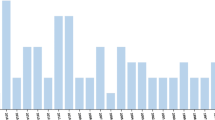Abstract
This analysis examines the emergence of feminist scholarship in the United States, specifically how a cohort of academic women came to challenge and propose revisions for the content and organization of academic knowledge. It is based on in-depth interviews from a larger two-year, multi-site study. The intellectual biographies and career histories enable us to consider how the current organization of knowledge has constrained or facilitated feminist scholars who advocate interdisciplinarity and social change. The analysis uncovers some of the processes by which intentional intellectual communities are formed and sustained within the current systems of disciplinary peer review and academic rewards.
Similar content being viewed by others
References
Astin, H. and Snyder, M. (1982). ‘Affirmative action 1972–1982 - a decade of response’, Change July/August: 26-59.
Bledstein, B. (1976). The Culture of Professionalism: The Middle Class and the Development of Higher Education in America. New York: W. W. Norton & Company, Inc.
Bowen, H. and Schuster, J. (1986). American Professors: A National Resource Imperiled. New York and London: Oxford University Press.
Gould, C. (1976). ‘The woman question: philosophy of liberation and the liberation of philosophy’, in C. Gould and M. Wartofsky (eds.), Women and Philosophy: Toward a Theory of Liberation. New York: G. P. Putnam and Sons.
Gumport, P. (1987). The Social Construction of Knowledge: Individual and Institutional Commitments to Feminist Scholarship. Unpublished Doctoral Dissertation, Stanford University.
Gumport, P. (1988). ‘Surricula as signposts of cultural change’, The Review of Higher Education 12(1): 49–62.
Howe, F. and Lauter, P. (1980). The Impact of Women's Studies on the Campus and the Disciplines. Washington, D. C.: National Institute of Education.
Larson, M. S. (1977). The Rise of Professionalism: A Sociological Analysis. Berkeley and Los Angeles: University of California Press.
Menges, R. and Exum, W., (1983). ‘Barriers to the progress of women and minority faculty’, Journal of Higher Education 54(2): 123–144.
Nelson, G. (1987). ‘Harvard approves women's studies honors concentration’, Second Century Radcliffe News. Cambridge, MA: Radcliffe College.
Silva, E. and Slaughter, S. (1984). Serving Power: The Making of the Academic Social Science Expert. Westport, CT: Greenwood Press.
Sternhell, C. (1984). ‘The tenure battle: the women who won't disappear’, Ms. Magazine. October: 94-98.
Weber, M. (1958). ‘Science as a vocation’, in H. Gerth and C. Mills, (eds.), From Max Weber: Essays in Sociology. New York: Oxford University Press, pp. 129–156.
Westkott, M. (1979). ‘Feminist criticism of the social sciences’, Harvard Educational Review 49(4): 422–430.
Author information
Authors and Affiliations
Additional information
A draft of this manuscript benefitted from comments by Yvonna Lincoln, Gary Rhoades, Karen Sacks, Sheila Slaughter, Ann Swidler and William Tierney.
Rights and permissions
About this article
Cite this article
Gumport, P.J. Feminist scholarship as a vocation. High Educ 20, 231–243 (1990). https://doi.org/10.1007/BF00136228
Issue Date:
DOI: https://doi.org/10.1007/BF00136228




